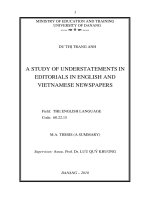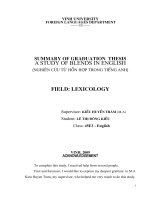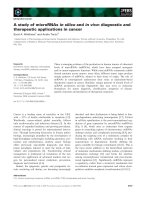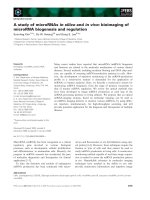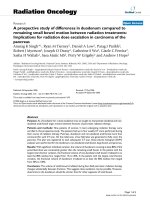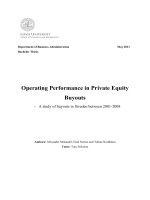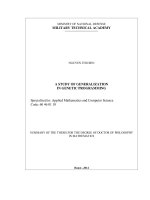A study of differences in pronunciation between american and british englsih and some pronunciation teaching implications
Bạn đang xem bản rút gọn của tài liệu. Xem và tải ngay bản đầy đủ của tài liệu tại đây (27.8 MB, 79 trang )
************************
"*
"*
"*"*
MINISTRY OF EDUCATION AND TRAINING
HOCffiMINH CITY UNIVERSITY OF FOREIGN LANGUAGES INFORMATION TECHNOLOGY
*
*
*
*'
*
"*'*
*
SCHOOL OF FOREIGN LANGUAGES
GRADUATION
PAPER
A STUDY OF DIFFERENCES
*"*
1%
*
1%
*
"*
*
*"*
*
"**
"**
*"** IN PRONUNCIATION BETWEEN
** AMERICAN AND BRITISH ENGLISH
*
1%
*'* AND SOME PRONUNCIATION TEACHING '**
*
*
'**
IMPLICATIONS
'**
*
1%
*
*
**
*
~,*
*
*
*
*
'*
Advisor: Mr. PH4M TAN QUYEN. M.A.
Student: TRUdNG THUAN VI
Student's number: 0071070
Class: SAQnl)' . Ai
...I'i-,.
ffi.r
A.
&tfF
~
.../I.-.,
**
'*
""
1'/GU.
l'S-:--'-----
,//
,,--:5,.-<.,~ ~••~)
II......•
/
I •
"I'I.f. E"-
-.,
'.
111
r~~:
'Y
'\ /-
l~'
'\;~ ,.-:-/
....
'
"'.f
.;\
',.,
.
,.,
;~~r;~~~
.~~
)";
,. .
..----:".'(\ J,....
__
...
~
-",I'
llA II(' I .\""
\'" ,/
Ho Chi Minh City, JUly 2004
~ ************************
...I'i-,.
~
...J1...
"'P!.
~
*
.4~
p:r
1%
.:
I
,-~'¥
I .
ACKNOWLEDGEMENTS
ABSTRACT
CHAPTER
ONE
CHAPTER TWO
INTRODUCTION.........................................
1
CONTENTS
2.1 Causes of the Differences between American
and British English
4
2.2 Standard American English and Received Pronunciation:......
14
2.2.1 Standard American English:
14
2.2.2 Received Pronunciation:
15
2.3 American vs. British English Pronunciation
2.3.1 Differences in Symbols of Transcription:
18
2.3.2 Differences in Consonant Production
a. Difference between /hw / and /w /:
23
b. Difference in pronunciation of /r /:
23
c. Difference in pronunciation of /1I:
27
d. Difference in pronunciation of /t/:
28
2.3.3 Differences in Vowel Production:
a. Difference between /0/ in AE and In/in RP:
31
b. Difference in /'J/:
31
c. Difference in /~/ , /~/
and
/A/:
d. Differences in foul and /eu/:
32
33
2.3.4 Different Pronunciation of Common Words:
a. Word Spelled with a:
35
b. Words with Syllable-Initial Alveolar Consonants:
36
c. Words with u Spelling Following Alveolar Consonants: 37
d. Words Spelled with er:
38
e. Words Ending in -ile:
38
f. Other Words:
39
2.3.5 Differences in Word Stress:
a. Verbs Ending in -ate:
41
b. Words of French Origin:
42
c. Stress in Three-or-Four-Syllable Words:
42
d. Secondary Stress DifIerences in Words Ending in -ily:43
e. Words Ending in -ary,-ery,-ory, and -many:
44
f. Place names ending in -aster/-ester:
45
g. Other Words Stress Differences:
46
2.3.6 Differences in Sentence Stress:
47
2.3.7 DifJerences in Intonation:
48
2.3.8 Differences in Overall Sound and Voice Quality:
50
CHAPTER THREE
RESEARCH FINDINGS AND PEDAGOGICAL PERSPECTIVE
METHOD
3.1 Description of the subjects:
52
3.2 Material:
53
3.3 Procedure s:
54
RESULTS/DISCUSSION
3.4 Students' attitude towards knowing the differences in
pronunciation between American and British English
55
3.5 Students' knowledge on the difIerences in pronunciation
between American and British English
60
CONCLUSION
/ IMPLICATIONS
62
APPENDIX
Questionnaire
Tapescri pts
REFERENCES
65
'"
68
Fit'st of all} J WOL\ldlike to expt'ess
QL\y.in} my advisot'}
Mt'. Phq.m Tdn
my acknowledgement to
fot' his valL\able
instt'L\ctions}
ct'iticism} comments and cot't'ections on this t'eseat'ch. Thanks to his
gL\idance} J COL\ldaccomplish
J
my gt'adL\ation papet'.
owe a gt'eat debt to Ms. BLti Thi Thanh Tt'Ctc fot' het'
SL\Pp0t't}valL\able matet'ials} and kind assistance.
J also wish to thank the tht'ee classes S;A0201}
and B;A0202
B;A0202}
of t-ILAFLJT fot' theit' enthL\siastic help in filling the
9 L\estionnait'e.
Finally}
J
wish to expt'ess my
heat'tfelt gt'atitL\de to my
pat'ents} my two sistet's} my pL\pils at £Aia r>inh t-ligh School} my
ft'iends
at
college}
Thanh}
Tt'I}
my
Vi> and
close ft'iends:
my
fiance
Thu}
;At'on
LAyen} QL\cjc} r>q.t}
Caton
fot' theit'
gt'eat
encoL\t'agement and SL\Pp0t'ttht'oL\ghoL\tthe wt'iting of this t'eseat'ch.
THANK yOU!
Tt'uong ThL\dn Vi
3L\ly 2004
This
research
aimed
at
(1) presenting
the
differences
in
pronunciation between American and British English, focusing on
differences in phonetic transcription symbols, production of consonants,
production of vowels, word-stress and description of other possible
differences in pronunciation; (2) finding out students' attitude towards
and knowledge on the differences in pronunciation between American
and British English. A questionnaire was designed and used in this
research. It was completed by 79 ESL students from 3 classes SA0201,
I'
BA0201, and BA0202 of Huflit. It was found that students are aware of
the benefits of knowing the differences on their learning. However,
most of them cannot distinguish the differences. The findings suggested
that the differences in pronunciation between American and British
English should be designed and incorporated into English course
syllabi. Also. further research is needed, focusing on differences in
vocabulary, spelling, and grammar, ect.
GRADUATION PAPER
1
"England and America are two countries separated by
the same language."
George Bernard Shaw.
People speak English in Britain, so do people in the
United States
but yet they don't speak the same language.
Mencken supports Shaw's comment:
"Every Englishman visiting the States for the fIrst
time." said an English dramatist
some time ago, "has a
diffIculty in making himself understood.
He often has to
repeat a remark or a request two or three times to make his
meaning clear, especially on railroads, in hotels and at bars.
The American visiting England for the first time has the same
trouble."... When he presented one of his own plays with an
English company, he said, many American acquaintances,
after witnessing the performance, asked him to lend them
the manuscript, "that they might visit it again with some
understanding of the dialogue." American speech is just as
diffIcultfor Englishmen.
Advisor: Mr. Ph~m Ta'n Quy~n
Student: Trliong Thua'n Vi
GRADUATION PAPER
2
They, Americans and Britons, find each other's speech just
as difficult, not to mention foreign learners of English. American
and British English are the two varieties of English which are
taught in most ESL/EFL programs. Knowing the differences
between these two varieties, more narrowly in pronunciation, is
a vital area which seems to be inappropriately considered in
any language teaching and learning process. Therefore, this
research
paper
aimed at
(1) presenting
the
differences in
pronunciation between American and British English; (2) finding
out students' attitude towards and knowledge on the differences
in pronunciation between American and British English.
There
British
are
English
many
such
differences
as
differences
between
in
American
and
spelling, grammar,
pronunciation, and vocabulary, ect. This paper is confined to
identifYing the
differences
in
pronunciation,
focusing on:
transcription symbols, production of consonants, production of
vowels, word-stress and description of other possible differences
in pronunciation.
Advisor: Mr. Ph~m Ta'n Quy~n
Student: Trtidng Thua'n Vi
GRADUATION PAPER
3
The report begins with an introduction. It is expanded in
the following chapter
by a - I hope - detailed analysis of
differences in pronunciation
between American and British
English. In Chapter 3, the information about the subjects, the
materials used in this study and the procedure in which the
study was carried out are described. The data collected from the
questionnaires will be subsequently analyzed and discussed. At
the
end
of this
research
paper,
a
conclusion and
some
suggestions on pronunciation teaching will be mentioned.
Advisor: Mr. Ph~m Ta'n Quy~n
Student: Truong Thua'n Vi
4
GRADUATION PAPER
" The reasons for American English being different from
British English are simple: As an independent nation, our honor
requires us to have a system of our own, in language as well as
government. "
Noah Webster (1758-1843)
The American history dated back to September of 1620,
when a ship called the Mayflower left England with 102 men,
women, and children onboard. Mter 65 days at sea, it landed in
what is now Provinceton Harbor, inside the tip of Cape Cod,
Massachusetts,
USA (Tiersky 1990,118).
When these
brave
puritans left England for the "New World", the language they
Advisor: Mr. Ph~m Tiln Quy~n
Student: Truong Thuiln Vi
GRADUATION PAPER
5
spoke on the Mayflower and also in their new homeland was
the English language which was at that
time employed in
England. That
English is similar to what we can find in
Shakespeare's
texts
(also
called
Elizabethan
English)
(Marckwardt 1958,8). Naturally, the language did not sound the
same as its present counterpart; many of the phonemes had
different qualities and the spelling of many words has changed
dramatically. This language, Elizabethan English, was what both
the people who left England and those who stayed used in their
everyday life. Therefore, both present day American and British
English have a common starting point.
However, today, there are a great number of differences
between American and British English which have developed
over those past centuries. The main reason for the differences
is the geographical distance
between these
Akmajian (1995,319) explained,
two countries.
"If one group of speakers
becomes isolated or sufficiently separated from another group of
speakers of the same language, they may each undergo their
own changes."
Advisor: Mr. Ph~m Ta'n Quy~n
Student: Trtidng Thua'n Vi
GRADUATION PAPER
6
The English used in American developed a character of
its own, reflecting the growth of the American nation. While
living in a new nation, the first task for the settlers was to find
names for concepts that did not exist in Britain; also, placenames had to be invented. The most fruitful source for these
words was the native languages of the American continent;
American Indian languages. Most of these borrowings somehow
deal with nature and Indian concepts as totem. There were no
words for most of the Indian concepts in English, and so the
most convenient way to "invent" words for English was to
borrow them from the Indians themselves, who were, so to say,
experts
in their field. Another source of impact was the
colonists'
cultural contact with the French. France was a
great empire at the time and therefore it is not surprising that
French should have some influence on English. While some of
the words were borrowed from French by the Indians and then
adopted to English, some other words were straight borrowings
from French into English: bureau. prairie, pumpkin and rapids,
to mention a few (Strevens 1972, 32). Americans seem to be
very open to borrowings. Mencken (1963) points out that
Advisor: Mr. Ph~m Tc1n Quy~n
Student: Trtidng Thuc1n Vi
GRADUATION PAPER
7
Americans incline "toward a hospitality which often admits
novelties for the mere sake of their novelties". So Americans
tend to borrow the words together with the way of saying
them. For example, while American English tends to mirror the
French syllable-final stress pattern for the word garage, British
English anglicizes this word with stress on the first syllable
(Celce-Murcia 2000). This is because Britons have a "tendency
to conserve what is established".
During all these years, the Indians were incorporated
into the United States, and many French, Spanish, and Dutch
speakers became citizens of the United States. This kind of
incorporation always changes the language. Even though these
people spoke their language at first, their children gradually
started using English and it was these different people that
finally adopted English. In parallel with this adoption, these
different peoples with different mother tongues also added
concepts and words to English, thus enriching it and giving
vividness to its vocabulary.
Advisor: Mr. Ph~m Ta"nQuy~n
Student: Trtidng Thua"n Vi
8
GRADUATION PAPER
The United States has been, over the years, a great
melting pot. Many immigrants from many different cultures
have brought along their personality, their labor, and their
language. One obvious example is that of the Italians who
bought
their
cooking to
America--and
also
their
cooking
vocabulary. The words pizza, pasta and spaghetti are of Italian
origin, but are common words for most Americans today.
Another source of American English still needs to be
mentioned, and that is the rapid growth of new and special
institutions
achieved.
in America after political
New
terms
were
needed
independence
for
election
was
and
administration, as well as for new political procedures. Words
such as assembly, congress, primary, president, representative
and senate all refer to American ideas, offices and practices and
are of pure American origin.
Furthermore, Americans are very innovative and coin
new words easily, as was the case with "burgers": first, you had
hamburger,
then
cheeseburger,
Advisor: Mr. Ph~m Tc1n Quy~n
beefburger,
baconburger,
Student: Trudng Thuc1n Vi
GRADUATION PAPER
9
fishburger and so on. This is a very fruitful way of creating new
words and American English seems to accept these kinds of
innovations more easily than British English. Mencken (1963)
excerpts a statement of an English observer, ''The Americans, in
a kind of artistic exuberance, are not afraid to use words as we
sometimes are in England".
As Americans live in a new independent
democratic
nation and a nation of immigrants, they bring the idea of
liberty and democracy into their daily language. They use the
language in a various, flexible and relaxing way. Consider the
way of pronouncing
the
sound
t
taken
from Ann Cook
(1991,87):
When you say a word like atom, imagine that you've
been to the dentist and you're a little numb, or that you've
had a couple of drinks, or maybe that you're very sleepy.
You won't be wanting to use a lot of energy saying /retom/,
so just relax everything and say / od:lm/, like the masculine
name. It's a very smooth, fluid sound. Rather than saying
BeTTy boughT a biT of beTTer buTTer, which is physically
more demanding, try Beddy bada bidda bedder budder. It's
easy because you really don't need much muscle tension to
say it this. way.
Advisor: Mr. Ph~m Ta'n Quy~n
Student: Trtidng Thua'n Vi
GRADUATION PAPER
From the
10
above remark,
it should be
obvious that
Americans have a tendency to simplifying everything; relaxing in
the way they speak; being
M
lazy"; creating comfort in everything
they are doing; and always wanting to show separation (from
mother country), independence, freedom and individual choice.
These characters
create a system of their own in language,
reflecting the growth of the American.
Besides, British's change as a result of time and social
change in the British Isles is another contribution to the
differences between American and British English. Strevens
(1972) explained that one of the changes in British English
from Elizabethan times onwards was the borrowings from
Latin and Greek. Great quantities
of ideas and therefore
vocabulary were taken into English as scholars became aware of
the classical manuscripts.
Another borrowing was from an
entirely different source, foreign countries that made up the
British Empire. Strevens' examples of this include bungalow,
kangaroo, pyjamas and tea. Traders, administrators,
soldiers
and missionaries who had traveled the world and found that
Advisor: Mr. Ph~m Ta'n Quy~n
Student: Truong Thua'n Vi
GRADUATION PAPER
11
English lacked words for these concepts imported these words
to the English language (Strevens 1972, 30). Recently, British
English has had another source for borrowings: American
English.
Apart
from
Americanisms
that
are
used
with
consciousness for their American origin (for example, talk show
and hot dog), British English has started to use other words and
expressions that have originated in American English. Strevens
(1972, 30) points out some examples of this borrowing: to
enthuse, cafeteria, double-cross, a flop, gangster, highlight, and
popcorn.
During the
passage
of time,
British
English has
borrowed words and expressions from other languages and that
has influenced it greatly. However, it continues to do so and it
seems that the main source for borrowings is the variety once
developed from British English itself, American English.
In spite of the changes, British English" shows no living
change in structure and syntax since the days of Anne, and
very little modification in either pronunciation or vocabulary. Its
tendency is to conserve that which is established; to say the
new thing, as nearly as possible, in the old way; to combat all
Advisor: Mr. Ph~m Ta'n Quy~n
Student: Truong Thua'n Vi
12
GRADUATION PAPER
that expansive gusto which made for its pliancy and resilience
in the days of Shakespeare. In place of the old loose-footedness
there is set up a preciosity which, in one direction, take the
form of unyielding affectations
in
the
spoken
language..."
(Mencken 1963).
At the beginning, American English was "colonial" and
British English was dominant, the standard. During this period
the influence was, of course, from British English to American
English. Then came the time when American English created a
character of its own and became regarded as another important
variety of English. At present American and British English
have an equal status
and value. Naturally, there
is some
interaction going all the time and new ideas and expressions
are changed every day. American English has always been very
open to influence, but British English has stayed a "private
club" until recently, and has just in the past few decades
started accepting new ideas from American English.
Advisor: Mr. Ph~m T~n Quy~n
Student: Tru'dng Thu~n Vi
I
13
GRADUATION PAPER
American and British English have the
•
Elizabethan
English, but
these
two varieties
same origin,
are
relatively
different from each other today. The different social and
political
events
have
greatly
languages, and so has the
influenced
both
these
immigration. Because of the
geographical distance between these two countries both these
languages could have developed in their own directions and
therefore the differences between them are, because of that
distance,
so easily spotted.
However, American and British
English have more in common than they are different from
each other, and that is why they are treated as varieties of one
language, English, rather than two separate languages.
Advisor: Mr. Ph~m Ta'n Quy~n
Student: Truong Thua'n Vi
GRADUATION PAPER
There
Britons,
as
are
they
14
clear
distinctions
may be
in how Americans and
generally
categorized,
use
their
language. However, considering the vast differences in the way
Americans in different parts of the United States, and likewise,
Britons in different parts of Britain, use and pronounce English,
it is important
to consider
only one established
form of
American English and one of British English. As far as this
research
is concemed,
these
two forms will be (Standard)
American English and Received Pronunciation.
(Standard) American English (henceforth referred to as
AE) is defined as .. the English language as used in the United
States"
(Mc Arthur). Developed and
popularized largely by
Hollywood and Madison Avenue, AE is well-known and highly
recognizable
pattem
of
speech.
Advisor: Mr. Ph~m Ta'n Quy~n
The
Accent
is
Northem
Student: Truong Thua'n Vi
GRADUATION PAPER
15
American in style because the Northem States have dominated
the
communications
industry
since
the
Civil War
(Chwat
1994,10). During the last half-century, AE has become the
standard
for "educated" and
"nonregional" speech.
Chwat
(1994,10) also adds that television, radio, and the movies have
taught this accent to every ears of American. It is used by
national broadcasters,
public speakers and members of most
television show families. Moreover, it is also the language of
legal and govemmental functions and used in the schools as
vehicle for education (Akmajian 1995,265). Therefore, AE can be
used to affectively examine the differences between the English
spoken in the United States and that spoken in Britain.
Received Pronunciation (henceforth referred to as RP) is ..
the standard
pronunciation of educated Englishmen (Morris-
Wilson 1992,14). It is associated with the south-east, where
most RP-speakers live or work, but it can be found anywhere in
the country. Crystal (1995) states that RP tells us only about a
Advisor: Mr. Ph~m Ta'n Quy~n
Student: Truong Thua'n Vi
GRADUATION PAPER
16
person's social or educational background. In due course, RP
came to sybolize a person's high position in society. During the
19th century, it became the accent of public schools, such as
Eton and Harrow, and was soon the main sign that a speaker
had received a good education. It spread rapidly throughout the
Civil Service of the British Empire and the armed forces, and
became the voice of authority and power (Crystal 1995). it came
to be adopted by the BBC. When radio broadcasting began in
the 1920s, because it was a regionally 'neutral' accent, and was
thought
to be
more widely understood
than
any regional
accent,. During Second World War, it became linked in many
minds with the voice of freedom, and the notion of a "BBC
pronunciation"
grew.
Early BBC recordings show how much RP has altered
over just a few decades, and they point that no acccent is
immune to change, not even 'the best'. It is still the standard
accent of the Royal Family, Parliament, the Church of England,
the High Courts, and other national institutions; but according
to Hughes and Trudgill (1987,3) only about 3 percent of the
Advisor: Mr. Ph~m Ta'n Quy~n
Student: Truong Thua'n Vi
17
GRADUATION PAPER
English population speak
RP. Nonetheless
RP continues to
retain considerable status. It has long been the chief accent
taught to foreigners who wish to learn a British model, and is
thus widely used abroad (Crystal 1995). Hence RP is chosen to
examine the differences between British English and American
English.
Advisor: Mr. Ph~m Tcin Quy~n
Student: Trtidng Thucin Vi
18
GRADUATION PAPER
As Americans and Britons speak English unidentically,
their own phonetic notation is not alike. The two principal
phonetic transcriptions that will be compared in this paper are
taken from two different dictionaries. The first phonetic symbol
system is from Webster's New World College Dictionary, 3rd ad.
(NewYork: Macmillan, Inc. 1996), which are .. those widely used
by good speaker
of AE". The second system is from Oxford
Advanced Learner's
Dictionary (2000), which represents
the
pronunciation of RP.
Advisor:
Mr. Ph~m Tci'n Quy~n
Student:
Trudng
Thuci'n Vi
19
GRADUATION PAPER
Table 1
A comparison of two systems for transcribing
consonants
and vowels. The system used in Webster's New
World College Dictionary (1996) is appropriate for American
English, and the one used in Oxford Advanced Learner's
Dictionary (2000) represents
Class
Received Pronunciation.
Webster's
Oxford
New World
Advanced
College
Learner's
Dictionary
Dictionary
(1996)
(2000)
a
a
ago, agent
u
A
cup, abut
e
e
ten, berry
I
I
is, sit
a
D
hot, bottom
00
u:
look, pull
a
re
hat, asp
e
i:
even, see
ur
3:
fur, bird
a
m
car, hard
3:
all, horn
Short vowels
Medium vowel
Long vowels
A
0
Advisor: Mr. P~m
T&n Quy~n
Example words
Student: TrUOng Thuiin Vi
20
GRADUATION PAPER
Diphthongs
a
eI
hate, grey
0
au
home, boat
on
au
now, out
oi
JI
boy, noise
1
aI
five, buy
ir
Ia
fear, near
er
ea
hair, care
oor
ua
poor, tour
yoo
ju:
use, cute
yoo
ju
cure, globule
w
w
won, away
y
j
year, onion
r
r
zero, ground
I
I
let, pull
p
p
map, piper
t
t
tap, wet
k
k
kill, cognac
b
b
banana, pub
d
d
dad, drop
9
9
get, bigger
m
m
me, dam
n
n
now, train
g
g
ring, anger
s
s
sit, juice
Glides and liquids
Unvoiced stops
Voiced stops
Nasals
Unvoiced fricatives
Advisor: Mr. Ph~m Ta'n Quy~n
Student: Truong Thua'n Vi
